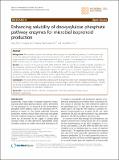| dc.contributor.author | Zhou, Kang | |
| dc.contributor.author | Zou, Ruiyang | |
| dc.contributor.author | Stephanopoulos, Gregory | |
| dc.contributor.author | Too, Heng-Phon | |
| dc.date.accessioned | 2013-01-23T21:57:41Z | |
| dc.date.available | 2013-01-23T21:57:41Z | |
| dc.date.issued | 2012-11 | |
| dc.identifier.issn | 1475-2859 | |
| dc.identifier.uri | http://hdl.handle.net/1721.1/76588 | |
| dc.description.abstract | Background:
Recombinant proteins are routinely overexpressed in metabolic engineering. It is well known that some over-expressed heterologous recombinant enzymes are insoluble with little or no enzymatic activity. This study examined the solubility of over-expressed homologous enzymes of the deoxyxylulose phosphate pathway (DXP) and the impact of inclusion body formation on metabolic engineering of microbes.
Results:
Four enzymes of this pathway (DXS, ISPG, ISPH and ISPA), but not all, were highly insoluble, regardless of the expression systems used. Insoluble dxs (the committed enzyme of DXP pathway) was found to be inactive. Expressions of fusion tags did not significantly improve the solubility of dxs. However, hypertonic media containing sorbitol, an osmolyte, successfully doubled the solubility of dxs, with the concomitant improvement in microbial production of the metabolite, DXP. Similarly, sorbitol significantly improved the production of soluble and functional ERG12, the committed enzyme in the mevalonate pathway.
Conclusion:
This study demonstrated the unanticipated findings that some over-expressed homologous enzymes of the DXP pathway were highly insoluble, forming inclusion bodies, which affected metabolite formation. Sorbitol was found to increase both the solubility and function of some of these over-expressed enzymes, a strategy to increase the production of secondary metabolites. | en_US |
| dc.description.sponsorship | Singapore–MIT Alliance for Research and Technology (Flagship Research Project) | en_US |
| dc.publisher | BioMed Central Ltd. | en_US |
| dc.relation.isversionof | http://dx.doi.org/10.1186/1475-2859-11-148 | en_US |
| dc.rights | Creative Commons Attribution | en_US |
| dc.rights.uri | http://creativecommons.org/licenses/by/2.0 | en_US |
| dc.source | BioMed Central Ltd | en_US |
| dc.title | Enhancing solubility of deoxyxylulose phosphate pathway enzymes for microbial isoprenoid production | en_US |
| dc.type | Article | en_US |
| dc.identifier.citation | Zhou, Kang et al. “Enhancing Solubility of Deoxyxylulose Phosphate Pathway Enzymes for Microbial Isoprenoid Production.” Microbial Cell Factories 11.1 (2012): 148. Web. | en_US |
| dc.contributor.department | Massachusetts Institute of Technology. Department of Chemical Engineering | en_US |
| dc.contributor.department | Singapore-MIT Alliance in Research and Technology (SMART) | en_US |
| dc.contributor.mitauthor | Zhou, Kang | |
| dc.contributor.mitauthor | Zou, Ruiyang | |
| dc.contributor.mitauthor | Stephanopoulos, Gregory | |
| dc.contributor.mitauthor | Too, Heng-Phon | |
| dc.relation.journal | Microbial Cell Factories | en_US |
| dc.eprint.version | Final published version | en_US |
| dc.type.uri | http://purl.org/eprint/type/JournalArticle | en_US |
| eprint.status | http://purl.org/eprint/status/PeerReviewed | en_US |
| dc.date.updated | 2013-01-15T16:05:27Z | |
| dc.language.rfc3066 | en | |
| dc.rights.holder | Kang Zhou et al.; licensee BioMed Central Ltd. | |
| dspace.orderedauthors | Zhou, Kang; Zou, Ruiyang; Stephanopoulos, Gregory; Too, Heng-Phon | en |
| dc.identifier.orcid | https://orcid.org/0000-0001-6909-4568 | |
| mit.license | PUBLISHER_CC | en_US |
| mit.metadata.status | Complete | |
